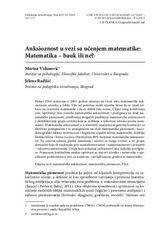Prikaz osnovnih podataka o dokumentu
Anksioznost u vezi sa učenjem matematike - matematika - bauk ili ne?
Mathematics related anxiety: Mathematics bogeyman or not?
| dc.creator | Videnović, Marina | |
| dc.creator | Radišić, Jelena | |
| dc.date.accessioned | 2021-10-12T11:16:17Z | |
| dc.date.available | 2021-10-12T11:16:17Z | |
| dc.date.issued | 2011 | |
| dc.identifier.issn | 0352-7379 | |
| dc.identifier.uri | http://reff.f.bg.ac.rs/handle/123456789/1173 | |
| dc.description.abstract | Podaci PISA testiranja iz 2003. godine ukazuju na visok nivo matematičke anksioznosti učenika u Srbiji. Više od polovine naših učenika brine da će imati teškoće na časovima matematike i da će dobiti loše ocene. Ciljevi ovog istraživanja jesu: ispitivanje veza između matematičke anksioznosti i postignuća na skali matematičke pismenosti; utvrđivanje mogućih prediktora matematičke anksioznosti i identifikovanje grupa učenika koje se razlikuju u njihovom odnosu prema matematici. Matematička anksioznost je u statistički značajnoj negativnoj korelaciji i sa školskim postignućem i sa postignućem na skali matematičke pismenosti. Sociodemografski faktori, motivacioni i kognitivni aspekti učenja matematike, doživljaj školske klime i klime na času objašnjavaju 40% varijanse matematičke anksioznosti. Na osnovu odnosa prema matematici učenici se mogu svrstati u tri grupe; dimenzije koje ih razdvajaju jesu nezainteresovanost -zainteresovanost i prisustvo - odsustvo anksioznosti. Grupa koja pokazuje anksioznost ima najlošije postignuće. Primenom kvalitativne analize ispitivani su stavovi učenika i nastavnika o specifičnim problemima u vezi sa nastavom i savlađivanjem gradiva iz matematike. | sr |
| dc.description.abstract | Data of the PISA 2003 survey indicate high levels of mathematics anxiety of students in Serbia. More than half of our students worry whether they will have difficulties in mathematics class or whether they will earn poor marks. Aims of this study therefore are: examining relationship between math anxiety and achievement at mathematics literacy scale; establishing possible predictors of math anxiety and identification of students' groups in relations to their relationship towards mathematics as a subject. Mathematics anxiety is statistically negatively correlated with school achievement and achievement at mathematics literacy scale. Socio-demographic factors, motivational and cognitive aspects related to learning mathematics, perception of school and classroom climate explain 40% variance of mathematics anxiety. Based on students' relationship towards mathematics they cam be divided into three groups; while dimensions that apart them are uninterested-interested in mathematics and presence-absence of anxiety. The group displaying anxiety scores lowest among the three. Applying qualitative analysis students' and teachers' attitudes on specific issues related to teaching and learning mathematics was examined. | en |
| dc.publisher | Univerzitet u Beogradu - Filozofski fakultet - Institut za psihologiju, Beograd | |
| dc.relation | info:eu-repo/grantAgreement/MESTD/Basic Research (BR or ON)/179018/RS// | |
| dc.relation | info:eu-repo/grantAgreement/MESTD/Basic Research (BR or ON)/179034/RS// | |
| dc.rights | openAccess | |
| dc.rights.uri | https://creativecommons.org/licenses/by-sa/4.0/ | |
| dc.source | Psihološka istraživanja | |
| dc.subject | PISA | sr |
| dc.subject | matematička pismenost | sr |
| dc.subject | matematička anksioznost | sr |
| dc.subject | PISA | en |
| dc.subject | mathematics literacy | en |
| dc.subject | mathematics anxiety | en |
| dc.title | Anksioznost u vezi sa učenjem matematike - matematika - bauk ili ne? | sr |
| dc.title | Mathematics related anxiety: Mathematics bogeyman or not? | en |
| dc.type | article | |
| dc.rights.license | BY-SA | |
| dc.citation.epage | 177 | |
| dc.citation.issue | 2 | |
| dc.citation.other | 14(2): 157-177 | |
| dc.citation.rank | M52 | |
| dc.citation.spage | 157 | |
| dc.citation.volume | 14 | |
| dc.identifier.doi | 10.5937/PsIstra1102157V | |
| dc.identifier.fulltext | http://reff.f.bg.ac.rs/bitstream/id/162/1170.pdf | |
| dc.type.version | publishedVersion |

